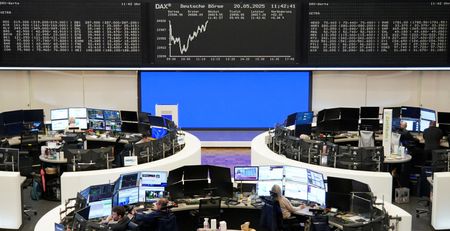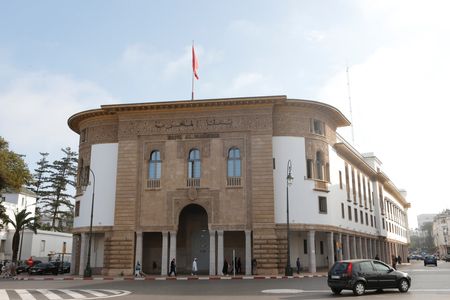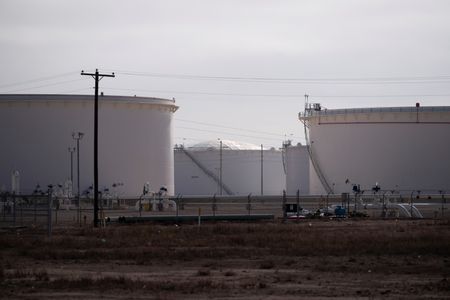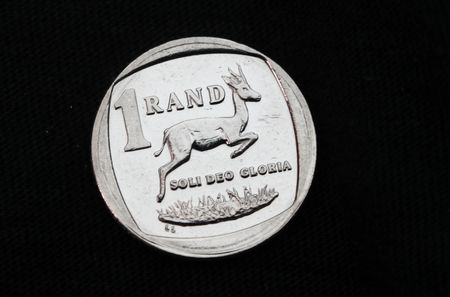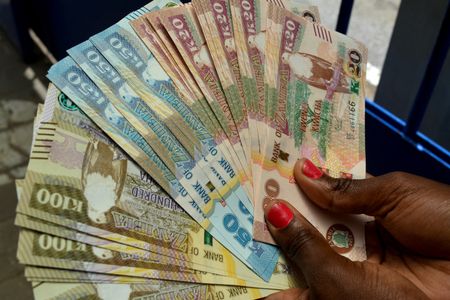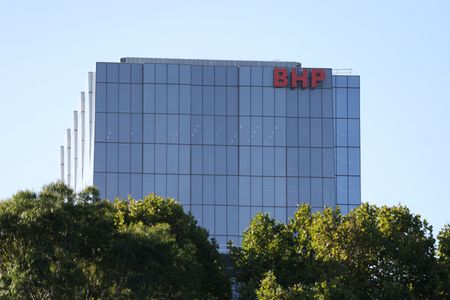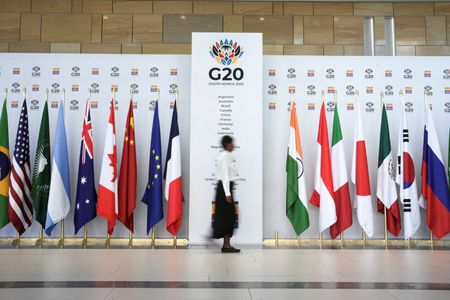By Wayne Cole and Lucy Raitano
SYDNEY/LONDON (Reuters) -European shares were softer on Monday as markets awaited developments in trade talks, as well as a European Central Bank policy meeting later this week, while U.S. futures were brighter ahead of some major tech earnings.
The European Union is exploring a broader set of possible counter-measures against the United States as prospects for an acceptable trade agreement with Washington fade, according to EU diplomats.
Investors had been hoping for some progress in trade talks ahead of U.S. President Donald Trump’s August 1 tariff deadline, with U.S. Commerce Secretary Howard Lutnick still confident a deal could be reached with the EU.
The pan-European benchmark STOXX 600 index was down 0.2% as was the UK’s blue-chip FTSE 100. The euro was 0.2% higher at $1.1652.
S&P 500 futures edged 0.2% higher, while Nasdaq futures were up 0.3%. U.S. indexes are already around record highs in anticipation of more solid quarterly earnings reports.
But tariff uncertainty is also casting a shadow over markets, with Trump’s August 1 deadline fast approaching.
“Let’s say that tariffs are pushed off again from August 1, which I think is the rosiest outcome at this point, then I don’t think markets will spike another 10% higher. I’m thinking more that we get a grind higher for the rest of the year,” said Oliver Blackbourn, multi-asset portfolio manager at Janus Henderson.
Markets, meanwhile, are gearing up for a host of big tech company results this week, including Google owner Alphabet, Tesla and IBM.
“They are going to be key for sentiment because frankly there’s not a lot else to drive things,” said Michael Brown, senior research strategist at Pepperstone.
“We saw the banks deliver decent results last week, so you’d certainly be looking for the big tech names to keep up with that to reinforce the bull case (for equities),” he said.
Investors also expect upbeat news for defence groups RTX, Lockheed Martin and General Dynamics. Higher government spending around the globe has seen the S&P 500 aerospace and defence sector rise 30% this year, while defence stocks in Europe have also hit record highs.
MARKETS UNFAZED BY JAPANESE POLITICS
The yen firmed on Monday as markets shrugged off the Japanese ruling coalition’s defeat in upper house weekend elections.
Japan’s ruling coalition lost control of the upper house in an election on Sunday, further weakening Prime Minister Shigeru Ishiba’s grip on power ahead of the tariff deadline.
Ishiba vowed to stay on, which along with a market holiday, limited the reaction. The yen was 0.77% firmer at 147.655 to the dollar and up 0.5% against the euro.
“The loss was within the range of expectations, and actually the outlook was even more pessimistic,” said Nissay Research Institute chief economist Tsuyoshi Ueno.
“In terms of negotiations with the U.S., it is easy to doubt whether a government with such a weak foundation is reliable as a negotiating partner,” he added. “For the Bank of Japan, if there is political instability, it will be difficult to raise interest rates, and pressure on the yen will continue.”
The BOJ still has a bias to raise rates further, but markets imply little chance of a move until late October.
Elsewhere, euro zone government bond yields eased ahead of euro zone PMI data and the ECB meeting later this week, at which it is expected to leave rates at 2% following a string of cuts.
The euro dipped 0.5% last week, moving off a recent near-four-year top of $1.1830. The dollar index was 0.3% lower at 98.11.
U.S. Treasury yields fell, leaving the yield on the benchmark 10-year note down 5.5 basis points at 4.3757%.
Most Federal Reserve policymakers, including Chair Jerome Powell, have indicated leaving U.S. rates unchanged right now is warranted in order to gauge the inflationary impact of tariffs.
Markets imply almost no chance of a move in July and place a chance of 61% on a September cut and an 80% chance for October.
Powell’s reticence on rates has drawn the ire of Trump who threatened to fire the Fed chief, before backing down. The spectre of a potential political appointee who would seek to ease policy sharply has investors on edge.
In commodity markets, gold firmed 0.6% to $3,368 an ounce, with all the recent action in platinum, which last week hit its highest since August 2014. [GOL/]
Oil prices were caught between the prospect of increased supply from OPEC+ and the risk European Union sanctions against Russia over its war in Ukraine could curb its exports. [O/R]
Brent eased 0.27% to $69.09 a barrel.
(Reporting by Wayne Cole in Sydney and Lucy Raitano in London; additional reporting by Naomi Rovnick in London; Editing by Shri Navaratnam, Amanda Cooper and Toby Chopra)

